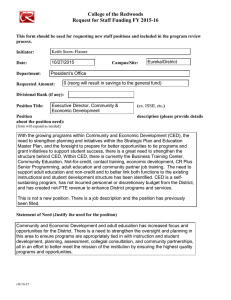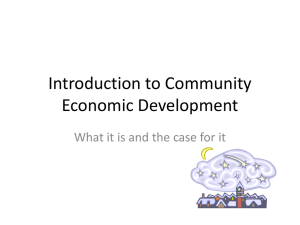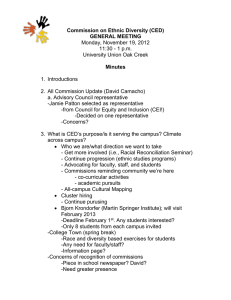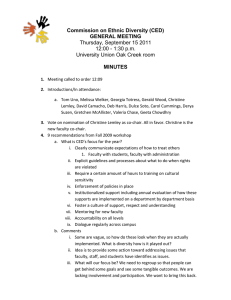COMMITTEE ON ENFORCED DISAPPEARANCES CED NGO INFORMATION NOTE
advertisement
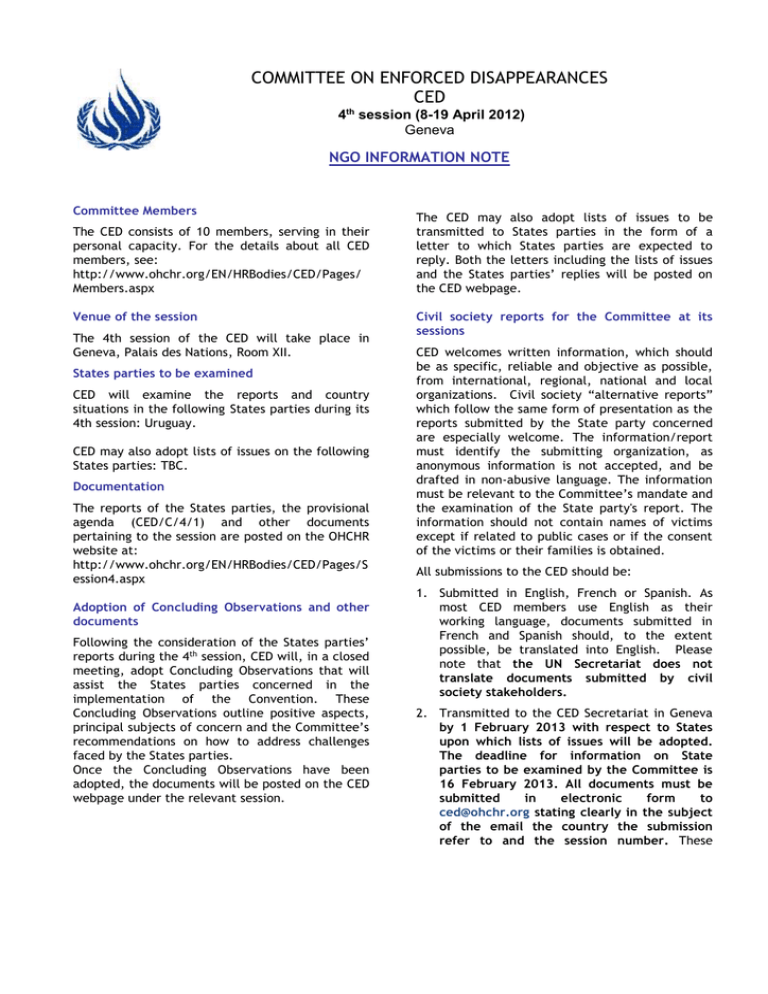
COMMITTEE ON ENFORCED DISAPPEARANCES CED 4th session (8-19 April 2012) Geneva NGO INFORMATION NOTE Committee Members The CED consists of 10 members, serving in their personal capacity. For the details about all CED members, see: http://www.ohchr.org/EN/HRBodies/CED/Pages/ Members.aspx Venue of the session The 4th session of the CED will take place in Geneva, Palais des Nations, Room XII. States parties to be examined CED will examine the reports and country situations in the following States parties during its 4th session: Uruguay. CED may also adopt lists of issues on the following States parties: TBC. Documentation The reports of the States parties, the provisional agenda (CED/C/4/1) and other documents pertaining to the session are posted on the OHCHR website at: http://www.ohchr.org/EN/HRBodies/CED/Pages/S ession4.aspx Adoption of Concluding Observations and other documents Following the consideration of the States parties’ reports during the 4th session, CED will, in a closed meeting, adopt Concluding Observations that will assist the States parties concerned in the implementation of the Convention. These Concluding Observations outline positive aspects, principal subjects of concern and the Committee’s recommendations on how to address challenges faced by the States parties. Once the Concluding Observations have been adopted, the documents will be posted on the CED webpage under the relevant session. The CED may also adopt lists of issues to be transmitted to States parties in the form of a letter to which States parties are expected to reply. Both the letters including the lists of issues and the States parties’ replies will be posted on the CED webpage. Civil society reports for the Committee at its sessions CED welcomes written information, which should be as specific, reliable and objective as possible, from international, regional, national and local organizations. Civil society “alternative reports” which follow the same form of presentation as the reports submitted by the State party concerned are especially welcome. The information/report must identify the submitting organization, as anonymous information is not accepted, and be drafted in non-abusive language. The information must be relevant to the Committee’s mandate and the examination of the State party's report. The information should not contain names of victims except if related to public cases or if the consent of the victims or their families is obtained. All submissions to the CED should be: 1. Submitted in English, French or Spanish. As most CED members use English as their working language, documents submitted in French and Spanish should, to the extent possible, be translated into English. Please note that the UN Secretariat does not translate documents submitted by civil society stakeholders. 2. Transmitted to the CED Secretariat in Geneva by 1 February 2013 with respect to States upon which lists of issues will be adopted. The deadline for information on State parties to be examined by the Committee is 16 February 2013. All documents must be submitted in electronic form to ced@ohchr.org stating clearly in the subject of the email the country the submission refer to and the session number. These deadlines allow the Country Taskforces and other members of CED time to read the reports before the relevant session. OHCHR does not reproduce civil society documents. Therefore, civil society representatives attending a session are requested to bring 20 hard copies of their documents for distribution at the meeting. Those not attending a session are requested to ensure that 20 hard copies of their documents reach the Secretariat of the Committee in time for the respective session, i.e. at least two weeks in advance. Contacts of the Secretariat: Maria Giovanna Bianchi Secretary of the Committee on Enforced Disappearances mgbianchi@ohchr.org Mounia Atiki CED Administrative Assistant matiki@ohchr.org Postal address of the Secretariat-Geneva: Committee on Enforced Disappearances Secretariat 8-14 Avenue de la Paix CH 1211 Geneva 10 Switzerland Attention: Maria Giovanna Bianchi / Mounia Atiki Accreditation Representatives of non-governmental organizations wishing to attend the session should register online at CSO-Net and follow the instructions for registration and for obtaining a ground pass: The registrations will be open from 2 February until 29 March 2013. Link for CSO-Net: http://esango.un.org/irene/index.html?page=view Content&nr=20523&type=8&section=8 Please note that OHCHR will neither send letters of invitations to civil society representatives to attend CED sessions nor assist with visa requests, travel or accommodation costs relating to their participation. Informal meetings and lunchtime briefings Civil society representatives are welcome to attend public meetings of CED as observers, but will not be given the opportunity to address CED during its meetings with the State delegation. Nevertheless, civil society representatives have the possibility of addressing the Committee in formal private sessions (closed meetings) with interpretation. These meetings are set out in the programme of work (see session webpage) and normally take place a day or two before the consideration of the report of the State party concerned. Informal (without interpretation) briefings may also be organized between civil society representatives and members of CED on the day prior to (or the day of) the examination of the relevant State party report. To find out the schedule of formal and informal meetings you may contact the Secretariat. There will be a designated room for these briefings. Please contact the CED Secretariat (mgbianchi@ohchr.org and matiki@ohchr.org) preferably before 25 February 2013 to confirm attendance at a formal briefing and/or informal briefing with the members. Further information For more information on how civil society stakeholders can participate in the reporting process, please consult the following link: http://www.ohchr.org/EN/HRBodies/CED/Pages/ CivilSociety.aspx
